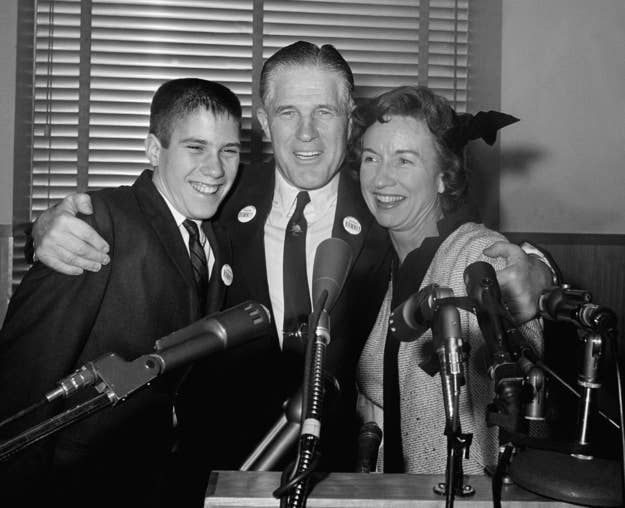
In 1966, George Romney released 12 years of personal tax returns in a move that would set the precedent of transparency for presidential candidates for generations to come — and eventually haunt his son, Mitt, as he tried to keep his own finances locked down while he sought the presidency decades later.
But he might never have done it if his biographer, T. George Harris, hadn't asked him to.
Harris, now 88 and living in La Jolla, Calif., told BuzzFeed he knew he was going out on a limb when he asked Romney for his latest Form 1040. At the time, it wasn't common practice for candidates to disclose information about their finances.
"But I had to opportunity, so I asked," Harris said. "Romney was uniquely open and responsive, and I was doing a biography of him... It seemed like a good opportunity."
The candidate resisted at first, arguing that a single year of tax returns wouldn't present an accurate picture of his finances. But then he called Harris back and made a surprising offer: He would release the past 12 years of tax returns, including those paid when he became a millionaire by saving American Motors Company. That way, Romney reasoned, the move wouldn't look like a stunt.
"That was sort of like him. He would take an idea and Mormonize it, expand on it," said Harris, suggesting that the elder Romney's reputation for challenging the status quo was born out of his religion's history, when pioneers roamed from one unfriendly region to another before eventually building a civilization in the western desert.
"The [early Mormon] migration was, you know, sort of like that," he said. "They went to Nauvoo, and then they went to Salt Lake. Yes, it was quite a journey, 1,200 miles across the desert."
Harris's biography of Romney was recently re-released by the small Garrett County Press, but Harris — who took a leave from Look magazine to write it — went on to a successful career in other areas of journalism, running Psychology Today in the 70's, and American Health in the 80's (both of which earned him general excellence National Magazine Awards).
Later in life, he helped start the religion news site BeliefNet.com, and he's devoted most of his writing in recent years to matters of spirituality. Harris said he's remained good friends with Mitt's aunt, Jane, a former actress in Los Angeles from whom he said he heard "just the other day." Throughout all that time, though, he never really got to know Mitt, whose carefully-plotted trajectory has been a notable contrast with his expansive father's, and who has not followed in his father's tradition of releasing tax returns.
Harris attributed their night-and-day approaches to political transparency to the contrast in the way the two men made their fortunes.
When the elder Romney took the reigns of American Motors, his public persona — and the one he assigned to his company — was that of a feisty populist, taking on the "Big Three" auto behemoths with an ad campaign that urged people not to waste money on "gas-guzzling dinosaurs." Under Romney, AMC developed a new line of smaller, more efficient vehicles like the Rambler, and made the case that these cars represented the best deal for the average driver.
"He got in a habit when he was working on the Rambler of making a point of disclosure and argument," Harris said of the campaign-quality messaging Romney pushed as CEO. "In that case, he was running against General Motors."
Both the ad campaign and the car were hits — even Harris said he bought a Rambler because "it was the cheapest way to drive" — and George Romney seemed to take from that experience a tremendous confidence in his own ability to level with the public. As Harris put it, "He discovered the benefits of openness."
Mitt, on the other hand, seemed to develop a different set of values in his private sector career. Whereas his father made a living selling consumer goods to the masses, Mitt made his money hashing out wonky, complex private equity deals behind closed doors. Far from taking their case to the people, Bain Capital thrived in an industry that was all but incomprehensible to the world outside the sharply-dressed Harvard MBAs who populated its ranks.
Harris declined to speculate as to why Mitt Romney won't release more tax returns, and said even when he was covering George, his attention rarely focused on the son who would eventually earn the Republican nomination.
"He was fairly young. He was at the house, but I didn't spend much time with him," Harris said. "His mother Lenore was a much more interesting person."
